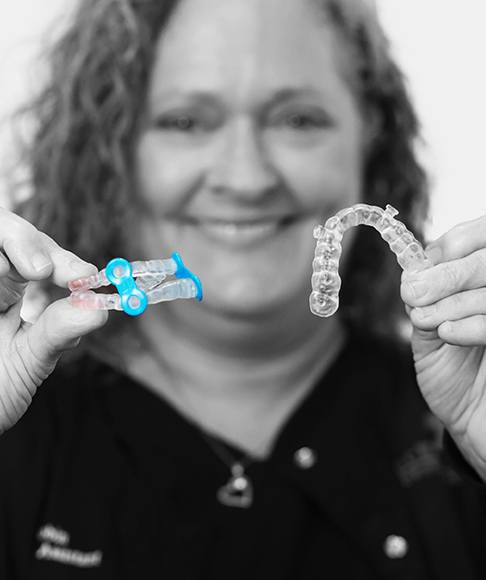Sleep Apnea Therapy Vero Beach, FL
Feel Like Yourself in the Morning
An estimated 18 million Americans have sleep apnea, which means they feel absolutely exhausted every morning and throughout the day. On top of this, many snore as well, meaning they also prevent their loved ones from resting. Does any of this sound familiar? If so, then Ocean Oaks Dental Group of Vero Beach is ready to offer a proven solution that is made just for you, and it is so small that it can fit easily in your pocket. To learn more about how it works, you can keep reading or reach out to our team by clicking here.
WHY CHOOSE OCEAN OAKS DENTAL GROUP OF VERO BEACH FOR SLEEP APNEA THERAPY?
- ORAL APPLIANCES MADE BY IN-HOUSE LABORATORY
- RECEIVE TREATMENT IN 24 HOURS
- 100% CUSTOM-MADE FOR EACH PATIENT
What Is Sleep Apnea?

When a person has sleep apnea, they temporarily stop breathing several times throughout the night. Minor cases see this happening about 10-15 times an hour, while it can occur over 100 times in severe instances!
Most often, the source of the problem is the tongue, oral tissues, and jaw over-relaxing and falling backward when someone lays down, and this ends up impinging (or cutting off) the airway. Once the body realizes it isn’t breathing, it automatically goes into panic mode and wakes up to restore normal respiration. These disturbances can be so slight that a person doesn’t remember them in the morning, but they will certainly feel their effects.
The Dangers of Sleep Apnea

The primary issue caused by sleep apnea is chronic exhaustion, which not only takes a toll on a person emotionally (being tired all the time makes someone more susceptible to feeling depressed or anxious), but it also makes them three times as likely to get into a motor vehicle accident (which is even worse than alcohol).
Sleep apnea is also very stressful on the cardiovascular system, as the heart has to work extremely hard to pump oxygenated blood around the body after someone has stopped breathing. Many sleep apnea patients develop hypertension that remains even after they are awake, putting them at an elevated risk of heart attack in stroke. In fact, an estimated 38,000 cardiovascular-related deaths in the U.S. are directly attributed to problems stemming from sleep apnea.
Sleep Apnea Treatment Options

While changes in lifestyle like weight loss, smoking cessation, and avoidance of alcohol have all been shown to help reduce sleep apnea symptoms, each of them has the same drawbacks—they are extremely hard and can take a long time before someone will see the benefits.
At Ocean Oaks Dental Group of Vero Beach, we’re able to provide patients struggling with sleep apnea and snoring with a more immediate solution—oral appliance therapy. All a patient has to do is wear a custom-made mouthguard to bed each night, and it will make sure the airway remains open, allowing someone to breathe normally and sleep deeply.
We can typically make our Snore Stopper Appliance in about 24 hours thanks to our in-house lab, meaning you can start enjoying a full night’s rest without delay. Each one is made based on a scan of a patient’s teeth and milled from high-quality resin to ensure it will stand the test of time.
Obstructive Sleep Apnea FAQs
Does Everyone Who Snores Have Sleep Apnea?
Snoring is simply the sound that occurs when air moves past tissues in the throat, causing them to vibrate. The presence of snoring does not automatically mean that a person has obstructive sleep apnea (OSA), and the absence of snoring does not mean that a person does not have OSA.
However, it is worth noting that snoring and OSA do often occur together. The same tissues that cause snoring may inhibit a person’s ability to breathe. Loud, frequent snoring is the type of snoring that is most commonly associated with OSA.
How Long Are Sleep Apnea Events or Episodes?
Apneas (pauses in breathing) and hypopneas (periods of reduced breathing) can last anywhere from 10 seconds to 2 minutes. If you experience fewer than 5 of these episodes per hour of sleep, you are not considered to have OSA. If you have 5 – 15 episodes per hour, your OSA is considered mild. 30 or more episodes per hour is classified as severe.
Can I Diagnose Sleep Apnea on My Own?
OSA is not self-diagnosable. You should undergo an official sleep test to determine for sure whether you have this condition.
Of course, it is still a good idea to track the quality of your sleep. Using a journal, smart watch, or phone application, you can gain some insight into how well you are sleeping each night. Your doctor might even be able to use that data to determine whether you should be referred for a sleep test.
Will My Sleep Apnea Go Away If I Lose Weight?
In some cases, OSA occurs because fatty tissue around the neck and abdomen are placing pressure on the airway, leading to pauses in breathing. If that is true in your case, weight loss may lead to a reduction in your symptoms. In fact, your sleep apnea might even go away completely!
However, it is important to keep in mind that extra body weight is not the only potential cause of OSA. Even some very thin individuals have this condition, so weight loss is not a guarantee that your symptoms will improve.
